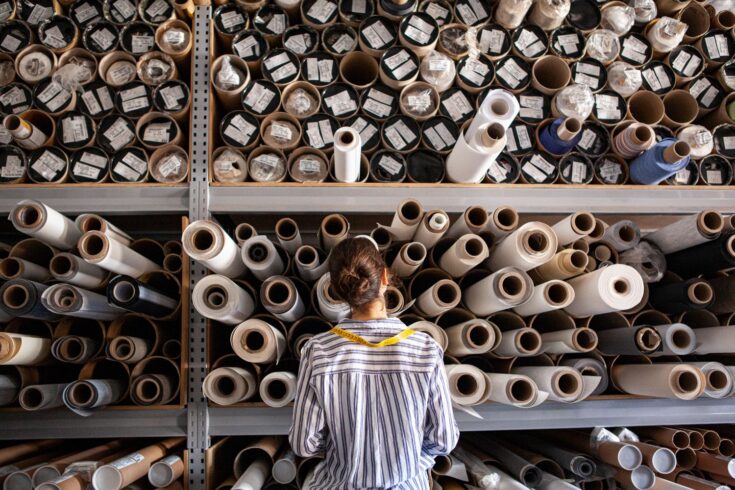The fashion and textile industry is estimated to be worth £21 billion to the UK economy, and provides more than half a million jobs.
But globally, the sector causes 8% of global greenhouse gas emissions and 20% of wastewater.
Fashion uses more energy than both aviation and shipping combined.
Reducing environmental impact
The complexity and reach of the industry means the true impact on the environment is not fully understood.
UKRI has funded three complementary teams of researchers, working in partnership with industry experts and other stakeholders.
The teams will build a bank of data and knowledge, and support the innovative sector in adopting sustainable circular business models.
Improving knowledge
The three networks are:
- the Back to Baselines in Circular Fashion and Textiles Network, which is being led by the University of Leeds. It will establish a baseline to analyse the current status of sustainability practices in the industry
- the Future Fibres Network, which is being led by the University of Exeter. It aims to embed environmental sciences at the heart of fashion, wider apparel, and textile sectors, and establish systematic, circular and sustainable principles as the industry norm
- the IMPACT+ Network, which is led by Northumbria University. It will assemble a cross-disciplinary team to improve the collation, analysis and assessment of data to advance the reliability and authenticity of environmental impact measures
A circular fashion sector
Professor Peter Liss, Interim Executive Chair of the Natural Environment Research Council (NERC), part of UKRI, said:
The fashion industry makes a significant contribution to the UK.
But it also impacts the environment, including using water resources and causing emissions of greenhouse gases.
We need to better understand the true impact.
This investment will bring together industry experts and researchers in environmental science and fashion to embed sustainability in the fashion and textile industry.
Creative leaders in a global industry
Caroline Rush, Chief Executive, British Fashion Council, said:
The British fashion industry leads in creativity and its founders and entrepreneurs are leading innovators in their field.
However, in order to responsibly grow businesses at a time of great change requires platforms, support and co-ordination.
We look forward to working with industry and government to support the UK in retaining its reputation as creative leaders in a global industry and to develop its ability to responsibly and collectively address how we accelerate to a leading Circular Fashion Eco-System in the UK.
Building for future generations
Adam Mansell, CEO of UKFT, the UK Fashion and Textile Association, said:
Sustainable manufacturing and recycling infrastructure will be key drivers in the move to a circular fashion ecosystem here in the UK.
We’re excited to work with the BFC to support our industry to connect, collaborate and share experiences to build the most resilient, sustainable and competitive sector for future generations.
Investing in sustainable practices
Funding of £6 million has been awarded by NERC, the Arts and Humanities Research Council and Innovate UK, all part of UKRI.
This investment is a key part of UKRI’s £15 million circular fashion programme.
Further information
Further information about the networks:
Future Fibres Network (FFN+)
Led by Professor Tamara Galloway, University of Exeter.
Other universities:
- University of the Arts London
- University of Leeds
- University of Huddersfield
- University of Plymouth
The vision of FFN+ is to embed environmental sciences at the heart of fashion and textile sectors.
It will establish systematic, circular and sustainable principles as the norm, and to build a critical mass of transdisciplinary expertise and methodologies.
A key objective is to counter the current siloed disciplinary approach that exacerbates the complexity of the environmental challenge.
The FFN+ consortium is uniquely placed to address this issue, operating across established networks of expertise spanning:
- environment
- design
- science, technology, engineering, and mathematics
- humanities capability across academic, industry, public and private organisations, communities and networks
Funding: £1.6 million.
Back to Baselines in Circular Fashion and Textiles Network
Led by Professor Stephen Russell, University of Leeds.
Partners:
- University of the Arts London
- Nottingham Trent University
- University of Huddersfield
- Manchester Metropolitan University
- Newcastle University
- Heriot-Watt University
- Royal College of Art
This interdisciplinary network will determine how to assess, evidence, and monitor the sustainability credentials of current and proposed practices across the fashion and textile industry to ensure congruence with net zero targets.
The work will identify the sectoral, disciplinary, technical, cultural, and skills-based barriers to transitioning to more sustainable practices. As well as those areas where specific interventions could result in the highest impacts, to decide where best to target future innovation and priorities.
The network will also take account of ongoing disconnects between design, manufacturing, retail, use and end-of-life disposal that contribute to environmental impacts.
Funding: £1.6 million.
IMPACT+ Network
(environmental Index Measures Promoting Assessment and Circular Transparency in fashion)
Led by Dr Alana James, Northumbria University.
Partners:
- Loughborough University
- King’s College London
The IMPACT+ Network will address contemporary challenges encountered when measuring the environmental impact of products, processes and behaviours across the fashion and textile value chain.
Current methods rely on self-reported and unverified data from brands, with measures often being siloed to focus on one impact alone failing to consider the much bigger picture.
As a consequence, steps to make the industry more sustainable are currently based on ill-informed and inaccurate data, meaning efforts are often inappropriate and misdirected.
This network assembles critical knowledge from multiple disciplines and industry experience.
Funding: £1.4 million.
Top image: Credit: Mindful Media, E+ via Getty Images

